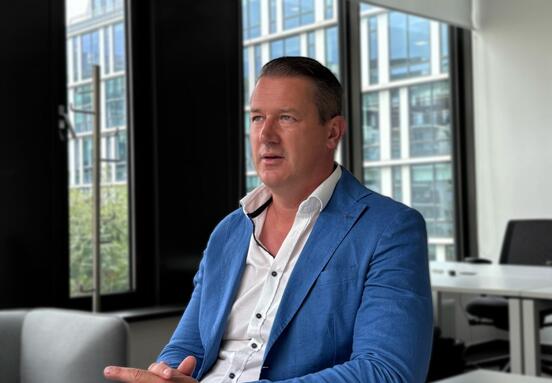- How have tenants' expectations changed or are changing after Covid and due to the rising energy costs? How are landlords responding to changing tenant expectations?
- I am not sure it is because of Covid, although that has had an impact, but we see that in the current market conditions, tenants’ expectations are increasing, they are looking for better deals, they are trying to eliminate risk from their side. Energy costs are a major concern for most people in the market, Landlords and Tenants. The increasing costs affect the service charge, the Tenant’s own energy consumption and costs, and the energy efficiency of the buildings. At CA Immo we had fixed our energy costs for last year, so we have protection against the worst of the market price swings for now. That in turn helps our tenants because their service charge is kept as low as possible. Hopefully we will see some form of return to normality during next year, but it is, as ever, difficult to predict. Landlords are making more competitive deals, and as there are not so many big deals to go after, landlords are being as flexible as they can be, but they have their own challenges in terms of running businesses, and any deal has to work from both parties’ perspectives.
- We agree that it is difficult to predict, but how is 2023 going to be on the office market?
- In 2022 we had one of the highest levels of supply for many years in Budapest and that made it a more tenant-friendly environment. Next year this supply will be substantially less, and we’ll have a more balanced market. Because of the general economic uncertainty that’s we see every day, it is difficult to be definitive and secure about how 2023 will be. If you look at the overall picture a lot of uncertainty is surrounding us, inflation, the forint-euro rate, the insecure situation of the EU funds - will they be released for Hungary and when?
- Have firms moved back or gone hybrid? Which trends are most prominent?
- I don’t think firms have moved back to pre-Covid working practices, most experts agree on that the hybrid working model is here to stay. The question is how companies deal with hybrid working, what do they consider it to be? Is it 3 days a week in the office, is it more flexible working hours, what is their approach to home office and what do they provide for their staff working from home? It varies from company to company how strict are they trying to be, some corporates are trying to bring back people to the office in a more structured way but it’s not really going quickly. Employees realized home office gives certain advantages for them and if companies are themselves flexible and adaptive, they can make an advantage of it as well. We believe that the future of office lies in the Premium, high-quality segment. We see that the requirements for the quality of office space are increasing, the office needs to be “better than home” and motivate the staff to come back to the office – which is important for many companies, as the office is key for corporate identification, employee retention and creative collaboration. We believe that social and collaborative functions of office space will be more important in future. The focus is on more communal areas, more services that can be provided by the landlords so it’s becoming not just a box you go to work in, but somewhere we are expecting to have something to eat, relax, perhaps do some work outside and socialize.
- How do you think the new buildings planned for the next few years are progressing? How can investors offset the rise in the cost of building materials and labour?
- It will be very interesting to see which buildings continue to move forward and complete, and which ones are delayed or postponed. I do not think it is possible to offset a rise in cost of the magnitude we have seen in the market over the past few years. If you look at 20-30% rises then that is not possible to offset, because the rents will definitely not rise at the same pace. If you’re planning a development but haven’t commenced construction then perhaps it is a more sensible decision to postpone committing capital or budgeting and costs will need to be reassessed, while trying not to reduce quality, given ESG requirements and tenant demands in this area, and overall, it will be very difficult to do. Longer term I do not foresee this extremely tight labour market will continue indefinitely, government projects are coming out of the market, infrastructure projects and developments of sports facilities are being completed or are being delayed, so I think without that pressure on the market we’ll return to a more normal situation.
- We have survived Covid, now we have the energy crisis, or let's say in the last few weeks there has been a lot of focus on efficient energy management. Are the landlords, tenants and property managers prepared for the expected increase in energy costs?
- It’s more than few weeks, we are seeing that focus over the last year, or more accurately the last few years. Now we have a particular focus on ESG, plus the energy prices have raised the attention of more people on it. Landlords have always prioritised energy-efficient buildings. With the energy crisis there are more detailed plans for individual buildings to help drive that efficiency, such as, how many lifts are working at what times, for how long do you need all common lighting to be switched on, etc. Also, it is worth noting that many tenants also have an agreed list of ESG measures with the landlords and that those include items which will have an impact on energy efficiency. In everyday management and certain longer-term strategies, we at CA Immo Hungary will always be energy efficient and ESG-focused, we have energy audits, we have green energy that we have bought. We are working together with our property managers every day to look at how we manage our buildings in the most efficient manner - for the benefit of our tenants and also the environment and climate.
- Do you see examples of property developers looking beyond the buildings to the urban environment? What can landlords do to create a more liveable environment - and not only for their tenants but also for the people living in the area?
- Our brand new community development at the Danube bank in the 9. district, near to the Millennium Towers building the Millennium Park we are developing as a new community space as we are providing something for the environment, something a bit more interesting, something a bit more enjoyable in this space, which is not just for the tenants but for everyone in the local district and beyond. We have turned the Danube promenade and the surrounding park next to the CA Immo office buildings into an attractive recreational/cultural and business centre for both tenants, visitors and residents of the area. The Pop up summer festival which we have organised this summer included the world-famous Cracking Art exhibition, quiz nights, yoga in the park, farmers’ market and preloved fashion fair. The customer is the tenant, but that’s not the only customer, you can create something that people living in the area would like to be part of. That is a major change in terms of how offices and office owners are considering their assets and how to invest in them.
Irodakereso.info








